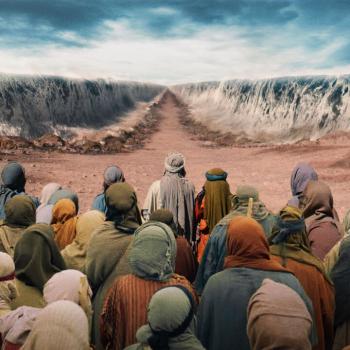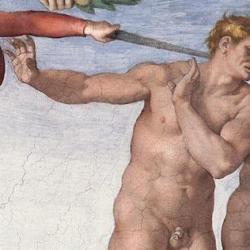Some thoughts on the sun/light symbolism in Genesis, inspired by a number of fine student papers on the subject.
1) The symbolism is set up in the first day of creation. Creation’s original state is dark, formless, and empty; and the work of creation produces a world that is bright, ordered, and teeming. From 1:2 on, darkness is a “reversion” to an original state, prior to the ordering work of the Spirit; light is the beginning of a new creation. Sunset is “decreation”; sunrise is new creation.
2) The sun is first described as the “greater light” in the heavens, created on Day 4. As the greater light, it “divides” light and darkness, and division is an act of creation (God divides in order to form). The greater light also rules, marks times and seasons, and is for a sign.
3) The first actual use of the word “sun” occurs in Gen 15, where Yahweh seals His covenant with faithful Abram. The covenant-making occurs as the sun is setting, and the Lord appears as a smoking pillar and flaming torch during the night, while Abram lies in deep sleep. There are several connections to make here. Sunset means decreation in view of new creation; Abram goes into darkness, and then emerges into light, because he is going through decreation and recreation, and because he is going to be the agent for the decreation of the world and its renewal. This connects also to the division of the animals in the covenant-making procedure, a sacrificial death-and-resurrection ritual.
Further, Abram going into deep sleep reminds us of Adam in the garden, who goes into deep sleep in order to receive his bride; Abram goes into deep sleep in order to receive the promise of a seed, which will be the bride, coming from Abram’s own flesh (15:4), as Eve did from Adam. While Abram sleeps in darkness, the Lord previews the later history of the exodus, and perhaps the Egyptian sojourn itself is to be understood as a period of darkness that ends with the dawning day of exodus. Finally, the sunset in Gen 15 is not explicitly reversed until Gen 19:23, when the sun rises over the destroys cities of the plain. In a sense, all the intervening events take place in the darkness of night.
4) The sunrise in 19:23 is clearly the beginning of a “day of Yahweh,” a day of judgment. During the night, Lot escapes from the doomed city, as later Israel will escape from Egypt at night.
5) Jacob’s sojourn with Laban also takes place at night. The sun sets at Bethel as he is leaving the land (ch 28), and during the night Yahweh reiterates the promises He made to Abram during the night of Gen 15. Jacob is a new Abram, a new Adam, and a new source for recreation. Though Jacob rises “early in the morning” (28:18), there is no explicit reference to the sun until Gen 32, when Jacob limps back into the land. His entire sojourn, like Israel’s in Egypt, is darkness, and only the return to the land brings a new day. As the sun rises on this new day, Jacob not only enters the land but enters it as a new man – as Israel.















